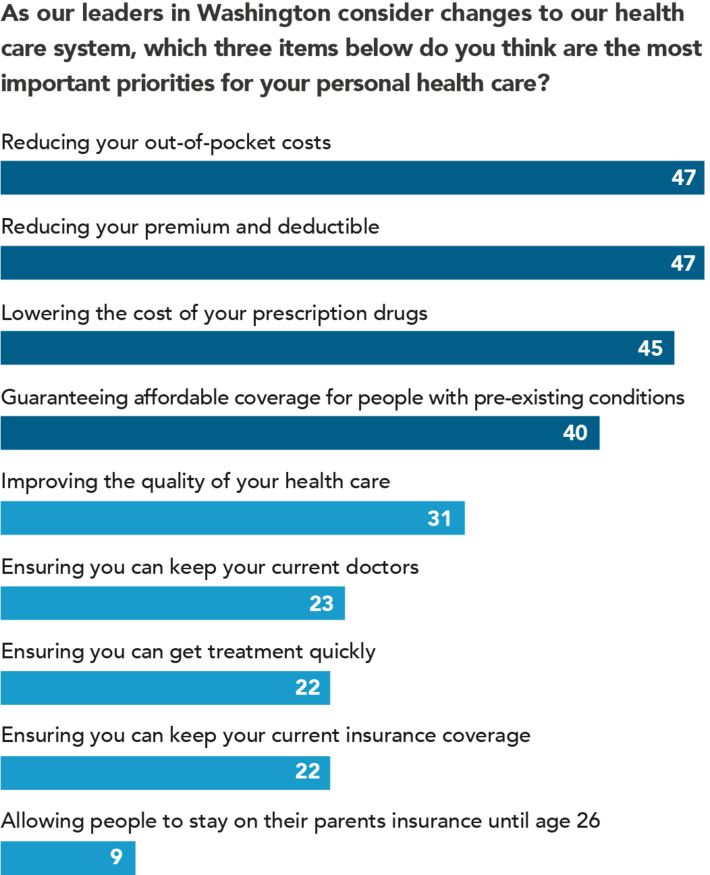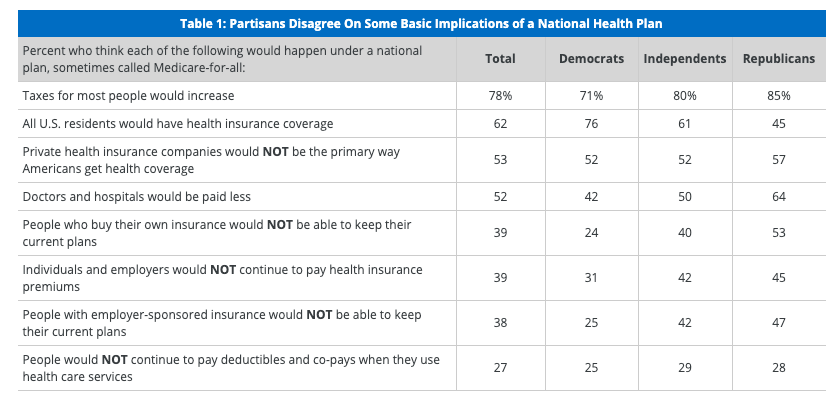Recent polls showing voters do not understand Medicare for All have received a lot of attention. But activists who’ve been working to educate the public on this issue for years aren’t surprised by the findings — and a closer look makes it clear people shouldn’t write off Medicare for All just yet.
The Kaiser Family Foundation released a poll on Tuesday showing voters don’t know defining features of Medicare for All — including some of the plan’s very popular provisions like the elimination of out-of-pocket costs. Democratic voters know less about it than Republican voters, with only 31% of registered Democrats understanding premiums go away under Medicare for All, as compared to 45% of registered Republicans. The telephone poll tracks with other recent surveys, including one released Monday by Navigator Research.
Some in the media have described the findings as a clear sign that the policy-turned-mantra is “backfiring,” or that Democrats should “steer clear of Medicare-for-all.” But various organizers who’ve been active in the single-payer movement for years say the polls confirm what they’ve long suspected: voters want Medicare for All and can be persuaded into accepting its possible trade-offs — they just don’t know it yet.
That’s because the polls also illustrate that the cost of health care is a top priority for voters.
When asked to define in their own words what health care issues they want to hear about from 2020 candidates, respondents to the Kaiser Family Foundation poll most often mentioned affordability. The Navigator survey also found that voters care more about reducing the costs of premiums, deductibles, and prescription drugs than keeping their current health plan. This suggests voters could be open to some of the trade-offs that come with implementing Medicare for All, as the policy eliminates virtually all private insurance and moves everyone into a singular public health plan with zero out-of-pocket costs.

Generally speaking, activists told ThinkProgress they’re skeptical of surveys, noting that pollsters are sometimes biased in the way they frame questions. That said, recent polls do highlight one important thing: voters are confused. Activists suspect the public doesn’t always understand Medicare for All because there’s tons of misinformation out there, and a lot of it is being spread by influential parties that benefit from maintaining the status quo.
“It’s incumbent on us to explain how people’s lives would change under the proposal, but we’re up against some very powerful corporate interests,” said Ken Zinn, political director for National Nurses United.
The country’s largest union for nurses has hundreds of volunteers who have been knocking on doors to build grassroots support for single payer since the midterm elections ended in November. Across the nation, the group’s volunteers have knocked on 20,000 doors and collected 14,000 signatures since February, according to the New York Times.
The nurses aren’t alone in their efforts, but work with activists affiliated with other groups, including the Democratic Socialists of America (DSA) which launched its single-payer campaign in 2017. Activists are concentrating on legislation recently introduced by Rep. Pramila Jayapal (D-WA), a bill similar to one introduced by Sen. Bernie Sanders (I-VT) two years ago.
“A big part of our campaign from the get-go was always to emphasize defining Medicare for All,” said Luke Thibault, a steering committee member with Democratic Socialists for Medicare for All. “Obviously there’s a large corporate campaign against Medicare for All and one of the key strategies has been muddling the meaning.”
Various groups with sway on Capitol Hill, like the American Medical Association and the Federation of American Hospitals, banded together last summer to lobby against Medicare for All. Meanwhile, conservative groups have formed a dedicated coalition to badmouth Medicare for All. Their message is focused on how the plan will lead to higher taxes, which is something many people already associate with Medicare for All, according to recent polls. Tax increases are an obvious way to generate money for a national health plan, but none of the Medicare-for-All bills include a detailed tax plan.

“Propaganda works,” said Alex Lawson, the executive director of Social Security Works, another group campaigning for Medicare for All but focusing its outreach on seniors. “That’s why they wield it to protect their literal existence as an industry.”
There are likely a lot of other factors at work. Health policy is inherently confusing, for example. The last major overhaul to the health system made this clear. A poll from as recent as 2017 showed one-third of Americans thought Obamacare and the Affordable Care Act were different laws.
There are also other plans with similar sounding names, and activists, along with media outlets, often use the popular phrase to describe something else altogether. Progressive Change Campaign Committee co-founder Adam Green, for example, is comfortable applying the term to proposals that would allow people to buy into the existing Medicare program.
Sometimes, Democratic politicians don’t correctly describe Medicare for All either, said Jennifer Epps-Addison, president and co-executive director of the Center for Popular Democracy. Sen. Kamala Harris (D-CA) told a town hall in May that “you will be able to keep your doctor” under Medicare for All because “91% of the doctors in the United States are in the Medicare system.” This statement wrongfully implied people are buying into the existing program. After she was repeatedly asked about her support for Medicare for All, Harris eventually said she’d be willing to sign on to more incremental bills. South Bend Mayor, Indiana, Mayor Pete Buttigieg (D) told The New York Times he thinks “we need to move toward single-payer. And the way I’ve proposed to do it is a kind of ‘Medicare for all who want it.’” But single payer means moving everyone into one public plan.
How politicians describe a plan is important because, as Kaiser Family Foundation’s director of public opinion and survey research told HuffPost, voters will sometimes repeat what their favorite politician says when they don’t understand the details of a plan.
“There are far too many people in the party who are afraid of the insurance lobby and afraid of the pharmaceutical lobby and taking campaign contributions from those lobbies,” Epps-Addison told ThinkProgress, “So rather than standing up boldly and telling constituents what is in this bill and advocating for the health care system we deserve, they are playing the center, opting towards compromise.”
For organizers, Medicare for All isn’t ambiguous; it’s never been a public option, which keeps private insurance. Even in its early days, when legislation was first introduced in 2003 and was a mere 26-pages long, Medicare for All meant a complete overhaul of the nation’s patchwork system — albeit, void on some critical details. (Today, the House and Senate Medicare-for-All bills still don’t show how the universal system will be paid for.)
Single-payer activists ThinkProgress spoke with say they aren’t changing their strategies, despite the recent polls. They’ll continue to work to get their message across to the American people and double down on these efforts as the 2020 election nears. The Democratic debates next week serve as another opportunity for the public to learn about Medicare for All. The hope is that one candidate will use his or her time to explain some of the plan’s details, for instance, that it will abolish provider networks that prevent people from accessing the doctor of their choice.
Activists also sound optimistic, pointing to recent congressional hearings and more House lawmakers who recently cosigned the Jayapal bill as proof that the long-term strategy is working. “We can win,” Thibault told ThinkProgress.
“The proven way to beat big money is with people — they’ve got money, we’ve got people,” said Lawson, “We need to actually just keep educating our folks and then turning our folks into activists, who go and teach other people about this.”

